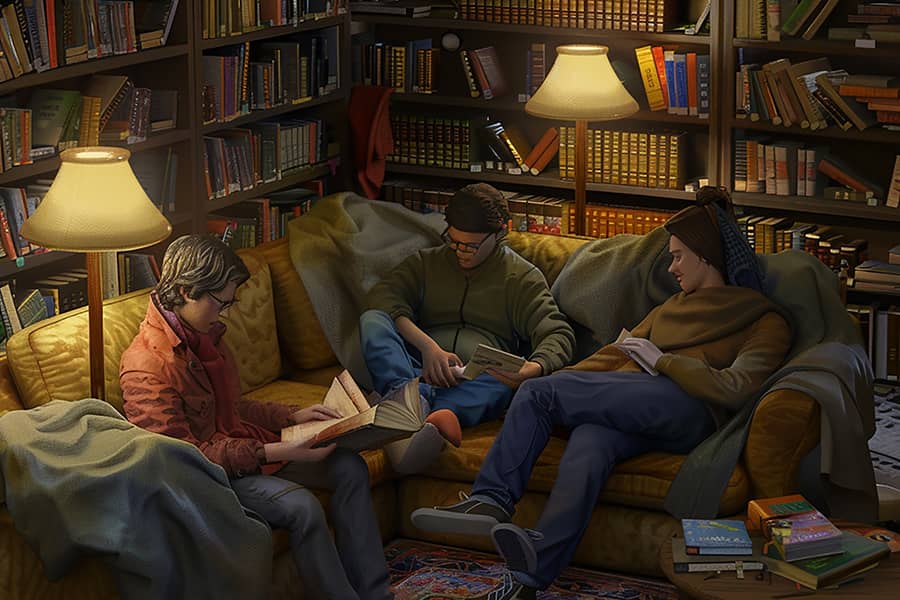These 7 Classic Novels Will Change How You See Life!

Introduction: Discover Transformative Literature
Literature has an unparalleled ability to expand our understanding and reshape our perspectives. Through the pages of classic novels, we encounter the intricacies of human emotions, societal norms, and the struggles for identity that echo across generations. These transformative works serve as mirrors reflecting both our realities and aspirations—inviting readers to delve deeper into their own lives while grappling with characters whose motivations often challenge our preconceived notions.
As we immerse ourselves in the rich worlds crafted by literary giants, we unearth profound truths that resonate far beyond fictional confines. Each novel acts as a time capsule, containing wisdom that transcends its era; those who dare to explore these narratives may discover insights about resilience in adversity, empathy amid conflict, or even the radical nature of hope. In this journey through literature, we’re not merely passive observers but active participants in a timeless dialogue about what it means to be human—redefining both ourselves and our place within the world.
The Power of Perspective in Novels
In the realm of literature, perspective serves as a powerful lens through which we experience both the story and ourselves. Classic novels often employ unique narrative voices that challenge our preconceived notions, forcing us to consider viewpoints far removed from our own. Take To Kill a Mockingbird, for example; Harper Lee masterfully uses Scout Finch’s innocent yet perceptive eye to reveal the complexities of morality and prejudice in her Southern town. Through her youthful curiosity, readers are invited to grapple with uncomfortable truths and reflect on the nature of justice.
Shifting perspectives can also unveil hidden layers within characters, inviting empathy where there may have been judgment before. Dostoevsky’s Crime and Punishment immerses us in Raskolnikov’s tortured psyche, blurring lines between right and wrong while prompting profound questions about guilt and redemption. This intimate access encourages readers to examine their own moral dilemmas, echoing far beyond the pages into everyday life. As we navigate various storylines shaped by distinctive narrators—be it unreliable storytellers or steadfast observers—our ability to understand different truths expands immensely, underscoring literature’s transformative potential in shaping how we perceive ourselves and others in an increasingly complex world.
Classic Novel #1: Exploring Existentialism
In delving into the depths of existentialism, classic novelists invite readers to confront the absurdity of life and the quest for meaning amidst chaos. One such profound journey can be found in Fyodor Dostoevsky’s Notes from Underground, where the protagonist wrestles with alienation and introspection. The fragmented narrative structure mirrors his turmoil, compelling readers to question their own beliefs about free will and societal norms. This dissection of self against a backdrop of existential dread prompts us to reflect on our choices and their intrinsic significance.
Moreover, consider Albert Camus’s The Stranger, a narrative that exemplifies the idea of life devoid of inherent meaning yet teeming with personal responsibility. The numbness exhibited by Meursault forces us to acknowledge uncomfortable truths about emotional detachment in a world that often demands conformity. Camus challenges us not only to live authentically but also to embrace our solitude as an integral part of human existence, prompting an exhilarating contemplation: Do we have the power—and duty—to carve out our unique paths despite a seemingly indifferent universe? Each reading reveals layers that resonate across generations, making these works essential touchstones for anyone grappling with their place within life’s intricacies.
Classic Novel #2: Love and Sacrifice
In the labyrinth of human emotion, few novels encapsulate the bittersweet dance of love and sacrifice quite like Les Misérables by Victor Hugo. At its core, this monumental work presents a tapestry woven from the threads of redemption, demonstrating how love can inspire selflessness against insurmountable odds. Jean Valjean’s journey from hardened convict to compassionate father figure encapsulates the transformative power of love that compels individuals to rise above their circumstances. This narrative invites readers to reflect on their own capacity for compassion and change, urging us to question what we would sacrifice in pursuit of true connection.
Hugo skillfully navigates through oppressive societal structures, showcasing how personal sacrifices ripple across communities. Fantine’s heart-wrenching plight as she relinquishes everything for her child’s future resonates with any parent who has wrestled with choices born out of love. As readers traverse Valjean’s path entangled with haunting moral dilemmas and social injustice, they are provoked to consider not just what it means to love deeply, but how those loves ignite commitments that transcend our own lives. Ultimately, Les Misérables serves as both a mirror and an impetus; it shines a light on our innermost desires while beckoning us toward acts of kindness that can redefine the contours of our humanity.
Classic Novel #3: Social Injustice Exposed
In the heart of **To Kill a Mockingbird,** Harper Lee masterfully unveils the deep-seated social injustices woven into the fabric of 1930s America. Through the eyes of young Scout Finch, readers are not only immersed in a coming-of-age story but are also drawn into a stark examination of racial prejudice and moral integrity. The character of Atticus Finch emerges as a beacon of justice, challenging systemic racism while instilling in his children the importance of empathy and understanding. This novel compels us to scrutinize our own biases and question the societal norms that persist today.
Similarly, **“The Grapes of Wrath”** by John Steinbeck portrays the struggles faced by Dust Bowl migrants during an era marked by economic despair. Through vivid storytelling, Steinbeck exposes how vulnerable populations suffer at the hands of an indifferent system that prioritizes profit over humanity. The plight of the Joad family serves as a poignant reminder that social injustice goes beyond mere statistics; it affects real lives with dreams, hopes, and relentless perseverance. As we navigate our modern world rife with inequality, this classic calls for reflection on our roles within these narratives—challenging each reader to confront uncomfortable truths about privilege and responsibility in pursuit of equity for all.
Classic Novel #4: The Struggle for Identity
In The Struggle for Identity, classic novels delve deep into the intricate labyrinth of self-discovery, where characters grapple with their place in society and their own sense of self. Take James Joyce’s A Portrait of the Artist as a Young Man, for example. Through the fragmented consciousness of Stephen Dedalus, readers witness a poignant exploration of artistic ambition juxtaposed with societal expectations. The narrative captures the essence of identity as fluid and evolving, suggesting that our true selves are often forged through conflict and rebellion against prescribed norms.
Similarly, in Ralph Ellison’s Invisible Man, the protagonist’s journey unveils profound truths about race, individuality, and invisibility within a conformist society. Readers are invited to contemplate how identity is shaped not only by personal choices but also by external perceptions and societal structures. This intricate dance between agency and oppression resonates powerfully today, reflecting ongoing dialogues around race and representation. Ultimately, these novels serve as timeless mirrors that compel us to confront our own identities while questioning what it means to truly be seen in a world filled with competing narratives.
Classic Novel #5: The Human Condition Unveiled
In Fyodor Dostoevsky’s Crime and Punishment, the intricate dance of morality and guilt unfolds, challenging readers to confront the darkest corners of the human psyche. Raskolnikov’s philosophical justifications for murder provide a profound exploration of existential despair and moral ambiguity, pushing us to question our own ethical boundaries. As we journey through his torment, we are compelled to reflect on the societal structures that shape our perceptions of right and wrong, ultimately revealing how external pressures can warp our internal compass.
The novel deftly examines alienation in an increasingly modern world, mirroring contemporary society’s struggles with isolation despite hyper-connectivity. Through characters like Sonya and Porfiry, Dostoevsky illuminates the redemptive power of compassion amidst suffering; it’s a poignant reminder that connection often lies at the heart of humanity’s survival. Ultimately, Crime and Punishment is not merely about crime but is an intimate study into human resilience—a call to recognize that understanding oneself fully requires embracing both light and shadow within us all. By grappling with these themes now as much as in his time, Dostoevsky invites readers to engage deeply with their own human condition, revealing timeless truths that resonate across generations.
Classic Novel #6: Nature and Humanity Intertwined
In the pages of classic literature, the intertwining of nature and humanity reveals profound truths about our existence. Take for instance Mary Shelley’s *Frankenstein*, where the natural world serves as both a backdrop and a mirror reflecting humanity’s deepest fears and aspirations. The desolate landscapes not only amplify Victor Frankenstein’s isolation but also symbolize the dangers of man’s hubris when attempting to conquer nature itself. This theme transcends its setting, urging readers to reconsider their relationship with the environment: Is progress worth the alienation from our own essence?
Similarly, in Henry David Thoreau’s *Walden*, nature becomes a canvas on which human introspection unfolds. Thoreau’s retreat into solitude invites us to explore simplicity, urging us to reconnect with our instincts amidst an increasingly complex world. His reflections challenge modern notions of success, suggesting that fulfillment lies not in material gains but in appreciating life’s finer details—from the intricate patterns of leaves to the sounds of crickets at dusk. Both novels remind us that humanity thrives not above nature, but within it; when we respect this bond, we unlock deeper self-awareness and empathy—not just for ourselves, but for all living beings intertwined in this delicate web of existence.
Classic Novel #7: Resilience in Adversity
In the heart of classic literature, a profound exploration of resilience can be found in “The Grapes of Wrath” by John Steinbeck. The Joad family’s harrowing journey from Oklahoma to California unveils not just the brutal realities of the Great Depression but also a deep-seated human tenacity that shines through adversity. Each setback—hunger, loss, and societal disdain—serves as a crucible for their strength, forcing them to confront their limits and redefine hope in a barren landscape. Steinbeck masterfully illustrates that resilience is not merely about survival; it is about community and the shared empathy that binds individuals together during struggles.
Similarly, Victor Hugo’s “Les Misérables” showcases the transformative power of perseverance against seemingly insurmountable odds. Through Jean Valjean’s relentless quest for redemption amid systemic injustice, readers witness how personal trials can lead to profound moral growth. Valjean’s story challenges us to rethink our approach to hardship—not as deterrence but rather as an opportunity for compassion and understanding. His evolution exemplifies how facing life’s darkest moments can ignite a spark of courage that transcends self-interest, urging us instead towards collective upliftment despite life’s relentless challenges.
Conclusion: Embrace Change Through Reading
Embracing change through reading is not just an act of picking up a book; it’s an invitation to explore new identities and ideologies. Each classic novel serves as a portal into worlds filled with complex characters, moral dilemmas, and transformative journeys. By immersing ourselves in these narratives, we challenge our existing beliefs and expand our understanding of humanity’s vast tapestry. Engaging with diverse perspectives helps cultivate empathy, reminding us that behind every story lies the potential for inner growth.
Furthermore, these timeless tales encourage us to reflect on our own lives. As we relate to the struggles and triumphs of iconic characters, we often find parallels in our personal experiences. The metamorphoses depicted on the page gently nudge us towards self-discovery and inspire courageous steps toward embracing change in our daily lives. Ultimately, diving into classic literature equips us not merely with stories but also powerful lessons—profound insights that invite us to remain open-minded and resilient as we navigate life’s unpredictable waters. So pick up a book and allow the wisdom crafted by past authors to guide you through future transformations; after all, change begins within those pages waiting for you!
Recent Posts
-
Advice for achieving a healthier and more joyful lifestyle
September 16, 2024




